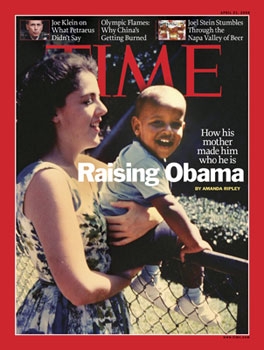
The Anthropologist’s Son
by Ruth Behar, Chronicle of Higher Education, November 28, 2008 and History News Network
Stanley Ann Dunham Soetoro earned a Ph.D. in anthropology with an 800-page dissertation about blacksmithing in Indonesia. She spent long stretches of time learning to love and rescue the cultures and communities of total strangers, at the cost of not always being around while her son was coming of age in Hawaii. Yet she had an indelible impact on him, teaching him to appreciate cultural diversity and have faith in people’s ability to understand each other across borders and identities.
The fact that Barack Obama’s mother was a cultural anthropologist has been noted with curiosity and amusement. A few commentators dismiss her anthropology credentials by describing her as part of a radical American fringe, while others represent her favorably, but as “unconventional,” “free-spirited,” or “bohemian.” That reputation is based on her two brief (and interracial) marriages and her wanderings through Javanese villages in an era when the stay-at-home mom was the public model of the American mother. Many now find it difficult to comprehend her passion for her adopted culture and her desire to live for years among the subjects of her research and advocacy work, though what she did was nothing out of the ordinary within anthropology.
As a cultural anthropologist, I think Obama’s family background is something to celebrate. But even more important, I think the time is ripe for cultural anthropology to become a fundamental part of American education and public culture. Anthropology needs to be taught alongside math, science, language arts, and history as early as elementary school and definitely throughout the high-school years. Its insights about the perils of ethnocentrism, racialization, and exoticized stereotypes need to become part of our everyday vocabulary.
Students shouldn’t have to stumble upon cultural anthropology, as I did, in their last year of college. I remember being thrilled to discover an academic discipline that focused on the complications of developing empathy with people who hold different worldviews. And I was enthralled by the idea of fieldwork, which calls for immersion in the day-to-day existence of people who might initially seem strange and incomprehensible, so that by grappling with our differences through face-to-face interactions, we might move beyond dehumanizing portrayals of “the Other.” For a Cuban-Jewish immigrant like me, who’d become all too familiar with the fraught experience of explaining who and what I was to others who wanted to box me into a single identity, the study of cultural difference was absolutely liberating.
I eventually learned that the discipline’s origins were not as humanistic as my ideals. Anthropology’s fascination with cultural diversity arose in the early 20th century from Westerners’ ruthless pursuit of colonial power and the arrogance of their presumed cultural superiority. The role of anthropologists was to elucidate the worldviews of “savages” in the third world before those cultures were swept away by modernity and capitalist development. Then in the 1950s and 60s, testimonies about the Holocaust revealed savagery in the heart of civilized Europe. Decolonization liberated Africa and Asia, and those who were once colonized began to ask, who was calling whom savage?
The discipline survived that crisis, and anthropologists became expert interpreters of cultures in transition….
[Ruth Behar is a professor of anthropology at the University of Michigan at Ann Arbor. During the spring semester of 2009, she will be a visiting professor in the humanities at the University of Miami. She is co-editor, with LucÃa M. Suárez, of The Portable Island: Cubans at Home in the World (Palgrave Macmillan, 2008).]